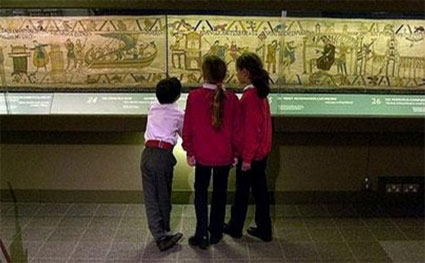Apr
8
2009
“Union Card”
E. Miner wrote, that “the ability to declare typology absent is a kind of proof of sound modern critical method.”
Which translated means, “Skepticism about typology is the union card of serious biblical scholarship.”
Peter J. Leithart, www.leithart.com
Comments Off | tags: Peter Leithart, Typology | posted in Biblical Theology
Apr
8
2009

The rejection of typology by modern conservative interpreters renders them unable to make any sense of the “oddities” in the New Testament, which are not vestigial organs but references to repeated themes.
These scholars limit themselves to the mechanics, when full interpretation requires a musician. They insist upon only ever studying the tapestry of Biblical revelation from the back. They miss many things that are obvious to Bible-taught children.
Comments Off | tags: Typology | posted in Biblical Theology
Apr
8
2009
“As you saw iron mixed with ceramic clay, they will mingle (intermarry) with the seed of men; but they will not adhere to one another, just as iron does not mix with clay.” Dan 2:43
I think the key to Genesis 6 is that this pattern is repeated many times in the Bible. It was the sin of INTERMARRIAGE, of compromise between the priesthood and unbelieving women. Adultery and idolatry have a close connection. Continue reading
Comments Off | tags: Babylon, Compromise, Genesis, Herod, Temple, The flood | posted in Biblical Theology, The Last Days
Apr
8
2009
One of the best ways to communicate truth in such a way as to grip the hearts and minds of the hearer is by means of story telling. The Bible is full of stories, designed for just this purpose. The whole theology of story telling could use a treatment in itself…
God is Himself the Great Story Teller. Being God, He can sovereignly superintend all events so as to bring His stories to life. His stories really happened. The fact that they are told as stories does not subtract one whit from their real historical character. Still, what gives them their thrilling power is not only that we know that they really happened in a certain year and at a certain place, but because they speak to us today.
Why do good stories speak to us today? Because, as students of literature would say, they embody universal characteristics, and deal with universal problems, hopes, fears, symbols, and so forth. This is exactly correct. Universal truths are not the same as abstract generalities, however. It is precisely in the specific events themselves that the most universal aspects of the stories are seen.
James B. Jordan, Judges: God’s War Against Humanism, p.ix
http://www.biblicalhorizons.com/pdf/jjju.pdf
Comments Off | tags: James Jordan, Judges | posted in Biblical Theology
Apr
8
2009
Excerpt from “A Knight of the Mind” — Dawkins, Darwin, and the Battle of Worldviews
http://www.albertmohler.com/blog_read.php?id=1189
Dawkins is characteristically helpful in exposing the real worldview of evolution. In his words, evolution disproves “the religious theory of intelligent design by God.”
In other words, Dawkins has as little respect for “theistic evolutionists” as he has for creationists. Continue reading
Comments Off | tags: Atheism | posted in Apologetics, Creation
Apr
8
2009
Judges, like all the so-called “history books” of the Old Testament, is really a prophecy. Judges is numbered among what are called the “Former Prophets.” These books were called prophecies because the histories they  recorded were regarded as exemplary. The histories showed God’s principles in action, and thus formed prophetic warnings to the people. If we read Judges merely as a set of exciting stories, we miss this.
recorded were regarded as exemplary. The histories showed God’s principles in action, and thus formed prophetic warnings to the people. If we read Judges merely as a set of exciting stories, we miss this.
To get at the prophetic meaning, we need to know four “secrets” of interpreting Biblical narratives. First, we have to take seriously the universals, as mentioned above. The first enemy who invades Israel in the book of Judges is Cushan-of-Double-Wickedness from Aram-of-Double-River. This is Mesopotamia. What is the prophecy? If the people do not live righteously, the enemy will come from Mesopotamia. And so it was. First Assyria conquered Northern Israel, and later Babylon conquered Southern Israel, so that even the idea of a two-fold destruction came to pass.
James B. Jordan, Judges: God’s War Against Humanism, p.xi
http://www.biblicalhorizons.com/pdf/jjju.pdf
Comments Off | tags: James Jordan, Judges | posted in Biblical Theology
Apr
8
2009
Some postmillennial POPtimisim from Newsboys:
Wherever we go, the dumb get wise
And the crime rates drop
And the markets rise
It’s a curious thing
But it’s just our thing
Bullies make nice, crooks repent
And the ozone layer shows improvement
It’s a curious thing
And it’s humbling
Wherever we’re led
All the Living Dead
Wanna leave their Zombie Mob
It’s a touching scene when they all come clean
God help us, we just love our job
Lyrics from Wherever We Go
1 comment | tags: Postmillennialism | posted in Quotes
Apr
8
2009
“It is surely a remarkable incident, if it is not the Providence of God, that these human, un-selfconscious letters of the very early days of Christianity should have been preserved. What is even more remarkable is their astonishing relevance today. It seems that the men who wrote these letters concentrated upon the essential spiritual core of human life. They provide that spiritual vitamin, without which human life is at best sickly, and at worst dead. While scarcely touching on any “modern problem” they yet manage to give pointers of principle which show the way, and the spirit, in which the problems of even a highly complex age such as ours may be tackled successfully.
The present translator who has closely studied these letters for several years is struck by two things. First, their surprising vitality. He is continually struck by the living quality of the material on which he is working. Some will, no doubt, consider it merely superstitious reverence for “Holy Writ”, yet again and again the writer felt rather like an electrician re-wiring an ancient house without being able to “turn the mains off”.
From the Translator’s Preface to Letters to Young Churches (The New Testament Epistles) by J. B. Phillips
Read Translators’ Impressions:
http://www.bullartistry.com.au/pdf_bestill/037BeStill.pdf
Comments Off | tags: John, Revelation | posted in Biblical Theology
Apr
8
2009
“…when one is confronted with the language of Revelation it is no mere difference of style which makes one gasp, but crudities, grammatical errors and a quite extraordinary juxtaposition of words. So wholly different is the book in its word-usage and composition from the Fourth Gospel that many scholars find themselves unable to believe that both could be written by the same person. The Fourth Gospel is written, within its limited vocabulary, smoothly and correctly and would probably have caused no literary qualms in a contemporary Greek reader. But Revelation piles word upon word remorselessly, mixes cases and tenses without apparent scruple, and shows at times a complete disregard for normal syntax and grammar… Continue reading
Comments Off | tags: Apocalyptic, John, Revelation | posted in The Last Days
Apr
8
2009
From Steven Wedgeworth’s blog http://wedgewords.wordpress.com
Our Faith is not primarily intended as a way to create a great culture. It is not primarily a way to run for political office. It is not primarily a way to advance literature, poetry, or song. All of these things are great effects of our faith, but they are not the reason to become interested in Jesus. Continue reading
Comments Off | tags: Biblical worldview, Dominion Theology | posted in Biblical Theology



























